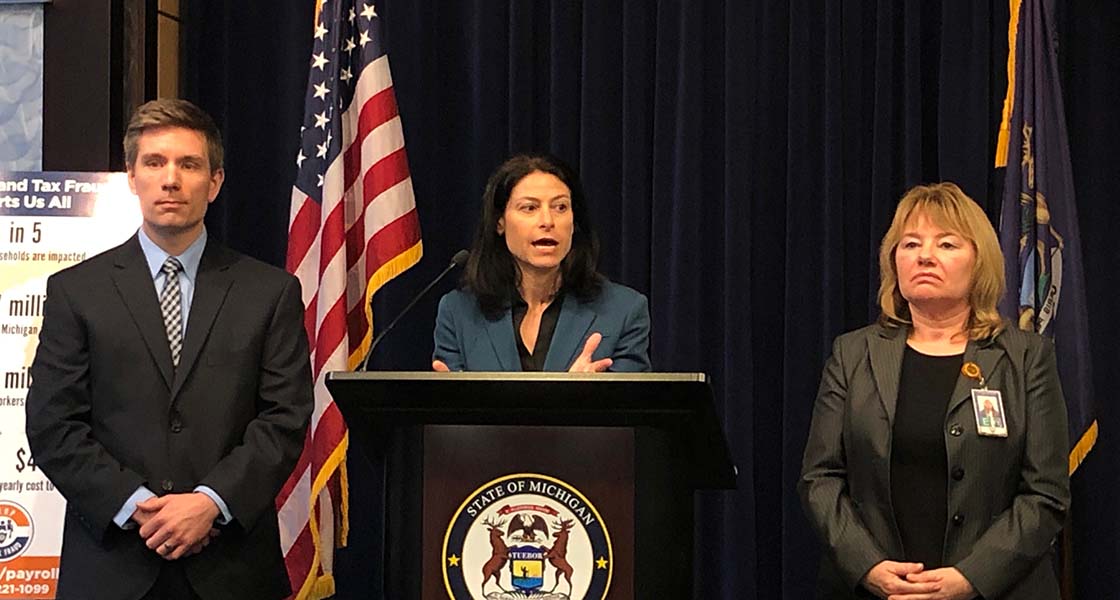
Attorney General Dana Nessel created a new unit in her office to investigate payroll and wage theft, following other dedicated enforcement units related to wrongful convictions and hate crimes since taking office in January. She is pictured here at a news conference in Lansing with Zachary Risk, an assistant attorney general who will lead the payroll fraud unit, and Debbie Taylor, chief of the labor division within the Attorney General’s office. (Bridge photo by Lindsay VanHulle)
Attorney General Dana Nessel on Monday said she will step up investigations of Michigan companies that don’t pay full wages and benefits to their employees.
The announcement is in keeping with her campaign promise to protect workers and labor unions. The event featured a number of union workers and Democratic lawmakers, but no Republicans, the majority party in the state House and Senate.
Nessel, a Democrat, is creating a payroll fraud enforcement unit within the Attorney General’s office to investigate such claims as wage theft, lack of overtime pay and misclassifying workers as independent contractors rather than employees.
The unit will be led by Zachary Risk, an assistant state attorney general, and housed within the office’s labor division. It will coordinate with other state departments and agencies — for example, the Department of Licensing and Regulatory Affairs’ Wage and Hour Division, or the Unemployment Insurance Agency — to investigate complaints against companies.
“These are companies that fraudulently report employees as self-employed and independent contractors, or they’re paying workers under the table,” Nessel said during a news conference in Lansing to unveil the payroll fraud unit.
“They refuse to pay overtime, benefits, health insurance and workers’ compensation. And because they cheat on time cards to keep costs off the books, they’re not paying their taxes,” Nessel said. “The majority of Michigan companies play by the rules, but those who don’t are cheating the system, raking in unfair profits and hurting Michigan in the process.”
Since taking office in January, Nessel has created several investigatory units within her office, related to claims of wrongful conviction and hate crimes. She also joined the Michigan Supreme Court to launch a task force focused on protecting seniors from abuse.
In her 2018 campaign, Nessel vowed to protect workers, winning endorsements and financial support from the state’s major trade labor unions in her race against outgoing Republican House Speaker Tom Leonard, whom she narrowly defeated in November.
Nessel was joined during Monday’s news conference by Democratic lawmakers, including Senate Minority Leader Jim Ananich, of Flint, and House Democratic Leader Christine Greig, of Farmington Hills. Both said legislation is expected to be introduced in coming weeks that would improve protections for whistleblowers who sound the alarm against companies, and toughen penalties for businesses that commit payroll fraud.
“Payroll fraud happens in the dark. The best way to catch those who cheat and steal is to hear directly from employees who are being taken advantage of,” Ananich said during Monday’s news conference.
“We want people to know that when they see something, they should speak up, and they will receive the full protection of the law,” he said.
The effort was lauded by the Michigan Regional Council of Carpenters and Millwrights, a labor union representing workers in the construction industry.
Business groups and Republican lawmakers were not present at Monday’s news conference. Representatives for House Speaker Lee Chatfield, R-Levering, and Senate Majority Leader Mike Shirkey, R-Clarklake, said the GOP leaders were not contacted prior to the news conference.
Nessel’s office said it intends to reach out to Republicans about the new unit, and the forthcoming legislation.
“This should not be a partisan issue,” Nessel said Monday, adding that she has worked on bipartisan legislation with Republicans related to criminal justice issues, such as civil asset forfeiture.
“(Republicans) should care just as deeply about this issue as the Democrats who are here in this room,” she said. “I’m very hopeful that moving forward, we are going to see Republican support, because this affects everyone in our state.”
Nessel said she intends to contact business groups about the new payroll fraud unit, saying she hopes they will support the effort.
Andy Johnston, vice president of government and corporate affairs for the Grand Rapids Area Chamber of Commerce, said the chamber has not yet heard from Nessel’s office about the payroll fraud unit.
“We look forward to that conversation and learning more about what she intends to do,” Johnston said, adding that the chamber needs to understand what Nessel wants to accomplish before it could weigh in on proposed remedies.
Wendy Block, vice president of business advocacy for the Michigan Chamber of Commerce, said in an email the state chamber also has yet to be briefed on the new enforcement unit and declined to comment until it had more details.
Nessel’s office cited data estimating the scope of the problem. A 2017 study from the Economic Policy Institute, a left-leaning nonprofit think tank based in Washington, D.C., found that roughly $429 million in total annual earned wages went unpaid to Michigan workers over minimum wage violations, using federal survey data from 2013 to 2015.
An older report published by Michigan State University found instances of employers wrongly classifying employees as independent contractors or otherwise not reporting their full payroll, which leads to lower state revenue and unemployment insurance payments.
Nessel said Monday that the industries with the highest numbers of offenses include construction, landscaping and janitorial services. Other instances can be found in child care, beauty and personal services, retail, food service and home health care, she said.
Nessel said her goals for the unit include increasing awareness and reporting of wage theft, increasing investigations into claims of wage theft, helping employers and workers reach cooperative resolutions and getting judgments against repeat offenders.

Spread the word